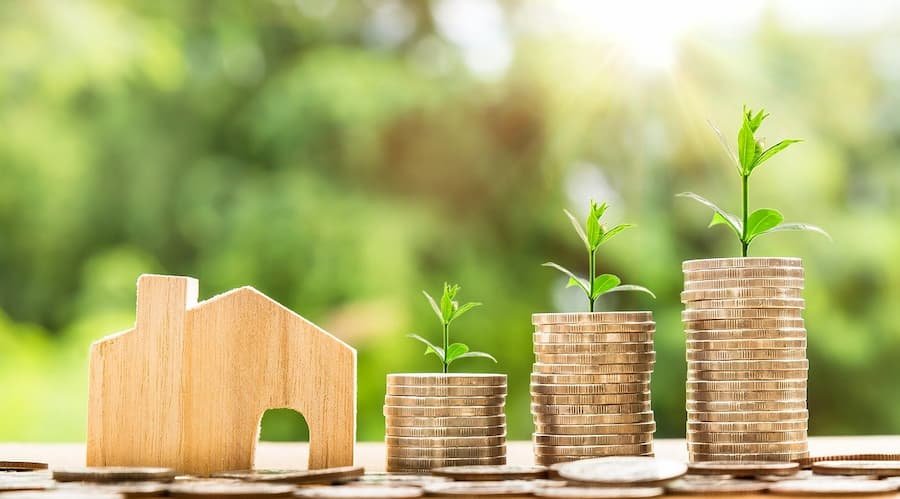Buying a home is a big investment, not just because it’s a major life milestone, but because it costs so much. Homeownership is something to be proud of and many people work hard to achieve it, but even with a savings account and a loan, buying a home is expensive.
The cost of buying a home leads many people to believe that owning a home can be nothing more than a dream. There’s a lot to keep in mind before and after buying a home and some people don’t believe it’s possible. If you’re willing to make a few changes and aren’t afraid of taking on a challenge, though, homeownership is within reach!
If you know you want to buy a home in the future or you’re already taking the first steps to do so, here are a few sneaky ways to save money when buying your home.
Table of Contents
#1. Split Up Your Paycheck
While it may feel like splitting your paycheck will make it more difficult to track and save money, it can be a great way to help you build up a savings account without having to try. If you’re able to put aside a portion of your paycheck, you’ll already have some money available when it comes time for the down payment.
Most banks allow you to set up automatic payments. You can schedule your checking account to send a certain amount to a separate account for every pay period. Whether this is $100 or $1,000, every little bit will add up.
The best part about automatic payments is that you don’t even have to think about them! Once your paycheck is deposited, your account does all the work to split it up and set aside some savings money for you.
#2. Pay Attention to Your Shopping Habits
If you know you have a problem with online shopping, make an effort to avoid sites like Amazon and unsubscribe from any promotional email lists you may be on. While spending $8 on a new bottle of lotion may not seem like a lot, it adds up quickly.
If you tend to wander the aisles at the store whenever you do your weekly shopping, try making a list and sticking to it. Tell yourself you’re only going to buy what’s on your list and avoid walking through aisles that you know you don’t need to go down. Having a handwritten list can make a huge difference in what you end up buying.
Every purchase you make should be worthwhile. Resist the urge to impulse buy or scroll through the clearance page on your favorite online store. If you’re worried this will be too difficult, try doing it every other month.
Another way to avoid impulse purchases is to transfer the money to your savings account instead. If you find yourself adding new items to your cart, either virtual or physical, make a mental note of the price and transfer that money directly into your second account. This can be a great way to show you just how much you spend every month on impulse purchases and inspire you to take a step back.
#3. Use Cash

Many people have heard about the study done by Drazen Prelec and Duncan Simester that talks about how much people are willing to spend with credit cards versus cash. When using a card, most people don’t hesitate before buying something they don’t particularly need or have a use for. When using cash for this purchase, these same people are likely to pause and reconsider.
If you’re trying to avoid spending money carelessly or saving up for a home, using cash is a great way to discourage impulse purchases. You’re much more aware of the money you’re spending whereas with a card, you won’t feel the bill for a month or so.
Another factor that favors cash over cards (at least for those hoping to save money) is that the average transaction is less. The average card transaction is $112 whereas the average cash transaction is only $22.
#4. Consider Foreclosed Homes
While it may sound a bit discouraging, many people are unable to keep up with their mortgages and end up losing their homes to the bank. The banks will then attempt to resell the home and earn back their lost money, meaning that these foreclosed homes will often be available at a much more affordable cost.
There are some disadvantages to buying foreclosed homes, but if you’re up for a challenge and don’t mind putting in some extra work, buying from the bank is a great way to find a house at a more affordable price.
Foreclosed homes bring their problems and there are many things you should know before buying one, but as long as you are prepared, it’s a viable option that can help you save money in the long run.
#5. Look at Fixer-Uppers
You may not like the look of some homes or they may be in a quite bad shape, but buying a fixer-upper of a home can give you both an affordable home and a way to personalize your space.
When you buy a home, the families that lived there before you will have all put their personal touches on it and it can be difficult to make it feel like your own place. If the home already needs to be repaired, though, you have full say in how it turns out.
Of course, it’s important to research the cost of all the necessary repairs and compare it with the cost of a fully functional home. If there are too many major repairs, you may not want to purchase it. However, you may be able to convince the seller to lower the price for you and get a great deal! Just make sure you’re using a Guelph real estate buying and selling expert to get the best price for you.
Stay Optimistic!

With the current market, it can be difficult to remain optimistic about your dream to buy a home. Prices seem to only go up and this is often very discouraging for potential homeowners. By staying optimistic and making a few lifestyle changes, though, you’ll find that owning a home is possible!
Read also: How to Spend Less on Your First Home

